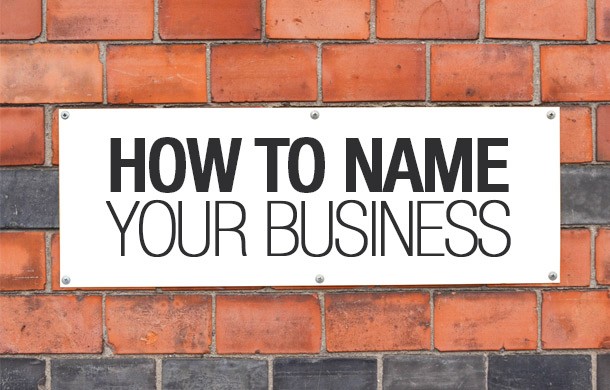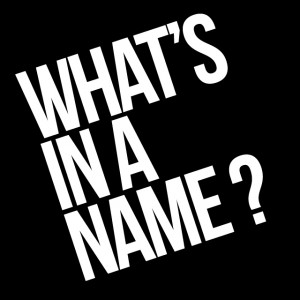Things To Consider Before Naming Your Business

 Considering all of the elements that go into starting a small business, it may be surprising to learn that choosing the right name is one of the most important decisions you can make. It’s the first thing potential customers and employees will learn about you and we all know the value of first impressions. Choose the wrong name and people will stay away. Pick the right name—that is, something catchy, feel-good, and web-friendly—and you may have more business than you can handle.
Considering all of the elements that go into starting a small business, it may be surprising to learn that choosing the right name is one of the most important decisions you can make. It’s the first thing potential customers and employees will learn about you and we all know the value of first impressions. Choose the wrong name and people will stay away. Pick the right name—that is, something catchy, feel-good, and web-friendly—and you may have more business than you can handle.
What to consider
Think about your business. What image comes to mind? People tend to think visually, so consider how the name will appear as part of your logo, on your letterhead, website, etc. This helps customers remember your name as well. Along with image, “feel” is an important element. You want a name that makes people feel good (or at least doesn’t drive them away). The right name should evoke an idea of what your business stands for and the emotional meaning you’d like to convey.
No one remembers a long business name (and translating it into a domain name can be impossible to recall). Imagine what the name will look like on a business card or advertisement. Short is sweet!
The right name should give customers a sense of what your business does. That’s why “Big Mountain Trucking” has the word “trucking” in its name. It helps people searching for your business online. How will the new name look when it’s abbreviated for an email address? Should the address include your first or last name? The goal is making things as easy as possible for customers.
What to do
Get the creativity process started with some old-fashioning brainstorming, on your own and with family and friends. Toss out ideas that convey a clear message and offer some positive connotations. Write out all the keywords you can come up with relating to you, your business and the products or services you provide. Don’t restrict your thinking to the business world; look to pop culture for off-beat references that spur your thinking forward.
Research your competitors and compare their names to your own ideas. (Don’t mimic or otherwise copy a competitor, as this creates confusion in the minds of potential customers.)
Speaking of customers, an in-depth understanding of your target audience can help direct new name ideas. What’s the age range? What do they do for a living? How do they make use of their leisure time? None of these considerations are off-limits when it comes to brainstorming a name for your business.
Give your top name finalists a trial run. Share them with colleagues, friends, family members and see how they respond. Pay attention to how they associate the new names with their own life experiences. Guaranteed you’ll hear things that surprise you. When you’re down to the top three or four names, it’s time to conduct a more refined search and registration. Google the names to make sure no one else has claimed them. And, since being active in social media must be part of your marketing plan, repeat the process on Twitter and Facebook.
Regardless of how “perfect” your great names seem, don’t rush to put things in motion. Set the list aside for a couple of days and come back to look at them with fresh eyes. You may feel differently about them, they may prompt further ideas or they may actually be perfect. Then you’re on your way.
Entrepreneurs who are fresh out of the gate with their business idea frequently ask my firm for advice about their branding: their corporate identity, logo and, of course, what to call their new venture.
Many of the considerations and concerns are universal, so here are a few of the basic facets that we convey (and addressed ourselves in naming our own shop, Clout) when the time comes to name your venture.
1. Shut up and say something
First and foremost, keep in mind that you are naming a business: This is a company and not your baby. As you begin to list out possible names, you must start by taking your train of thought forwards and backwards through their meaning. Ask “I want my name to say Y about my company,” and “Y would have these connotations.”
Test them out among those around you, anonymously online, with street-level strangers (as the founders of govWorks Isaza Tuzman and Tom Herman were seen doing in the documentary Startup.com). The world is your focus group.
When all else fails, hit them over the head with wording that is to the point and easy for your market to find you with. At some point, you have to stop deliberating and just be out with it.
2. Be unique but not esoteric
When being creative, decide how committed you are to using your surname (i.e. “Eastman”) versus a coined word (i.e. “Kodak”) versus existing words (i.e. “Film Company”) or a combination of all three. In all cases, it must be easy for everyone to identify, remember, pronounce and verbally convey.
When George Eastman and his mother coined “Kodak” as a brand name, they did so because (beyond his appreciation of it’s timbre) it achieved three of his most important criteria: it was short; it was almost impossible to mispronounce; and, it was something that he could have absolute ownership of.
When coining a word, always keep word of mouth in mind: How will your name be conveyed on the radio? (Google is a coined, phonetic interpretation of “googol” that people obviously took to with ease).
Avoid obscurity and being pedantic: If using a motif that’s particular to your industry, avoid using terms and jargon that would be foreign to outsiders (unless you are operating strictly business-to-business in an esoteric field).
3. Own it
Beyond knowing if you can legally proceed with your business name (in your given industry and/or jurisdiction), you need to determine if you can have “ownership” of it in your market. How tough a war will you have to wage in search engines to rank first for your business name? How hard will you need to fight for word of mouth and the like?
If you’re confident that you can use a business name to stake your ground, and to become a recognizable business (and that you are not flagrantly infringing on anyone or copying a competitor), add the name to your shortlist.
Avoid treading on an existing business name: Even if your product or service is geared to bolster or involve an existing brand, you may seem like you are riding coat-tails and could open yourself up to litigation. Think about how your company name will be used when it hits the streets: Will your market refer to you by part of or all of the company name? Will they use an acronym? What kind of nicknames, positive or otherwise, might emerge?
4. Scalability
We often tell new entrepreneurs not to neglect thinking of the scalability of their new company name (both literally and figuratively when it comes time to see it print, on swag, etc.). When choosing your new business name, you have to envision it in the present and future and in all of its forms: short, long, colloquial and the like alongside changes in the industry.
Will adding a noun to your business name really help you now (or hinder you later if you can’t easily change it or rebrand)? What happens when you expand markets, products, and territories? There’s a bit of an art and science here in not limiting yourself to one area if you foresee growth. For example, would Apple have chosen “Apple Computer” as their name had they foreseen becoming a large consumer and telephony electronics manufacturer?
5. Timelessness vs. Trendiness
It is very tempting for start-ups to hone in on buzzwords and memes. However, buzzwords can become passé as quickly as they become popular and using them can backfire painfully fast. What you think of as hip could quickly turn cheesy with your market if you’re trying too hard.
As Joselynn Maas aptly put it in her post about creating a logo for a small business, the best brands are those that can stand the test of time. Her example of Coca-Cola is perfect: great evidence of this is in seeing the consistency of their trademarks on the sides of stores in photos taken during the 19th, 20th and 21st centuries.
And, while it’s also in vogue to misspell words (especially to exploit web domains such as “.ie,” “.ly” or “.ee,”), doing so increases your risk of losing prospects in their search for you. If you go this route, be prepared to commit to concerted marketing and web efforts to detour your audience to your website, phonebook listing or the like.





